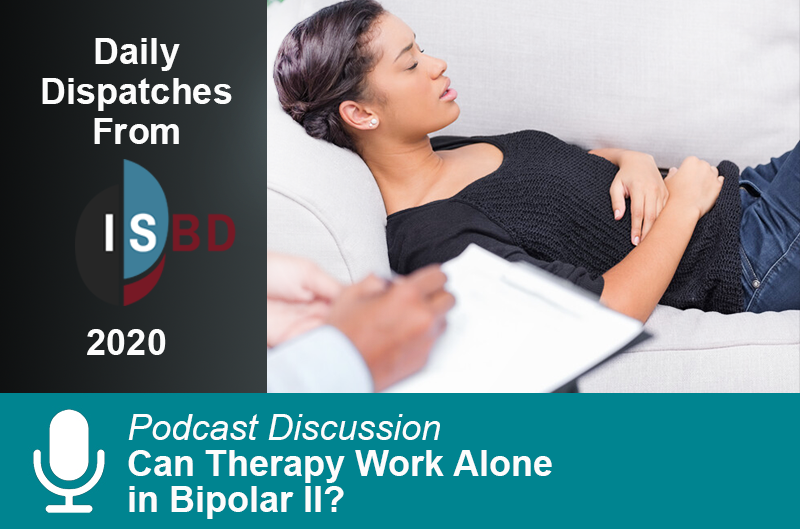Can therapy work on its own in bipolar II?
, Volume , Number ,
https://www.thecarlatreport.com/#
This week we’re podcasting from the International Society for Bipolar Disorders 2020 conference, where we’ve been scouring the virtual halls for all that is practical and newsworthy. The yield is high so tune in for a new episode every day. Today, unpublished findings on the first solo psychotherapy study in bipolar II. Published On: 7/2/2019 Duration: 4 minutes, 15 seconds Transcript: This week we’re podcasting from the International Society for Bipolar Disorders 2020 conference, where we’ve been scouring the virtual halls for all that is practical and newsworthy. The yield is high so tune in for a new episode every day. Today, unpublished findings on the first solo psychotherapy study in bipolar II. Welcome to the Carlat Psychiatry Podcast, keeping psychiatry honest since 2003. I’m Chris Aiken, the editor in chief of the Carlat Report. And I’m Kellie Newsome, a psychiatric NP and a dedicated reader of every issue. In 2018 Holly Swartz and colleagues published a first-in-class trial: They bravely tested whether psychotherapy alone could treat bipolar II depression, without medication. The small study of 77 patients randomized patients to interpersonal social rhythm therapy or IPSRT + quetiapine. The quetiapine group got better faster, but both groups had the same recovery rates at the end of the 5 months. Though preliminary, the results suggest that IPSRT may be a feasible therapy on its own for bipolar II depression. The study also yielded some interesting secondary outcomes. Patients were 4.5 times more likely to get better if they were randomized to the treatment they preferred to begin with – medication or therapy. Also, the therapy was not without biological effects. IPSRT actually improved markers of inflammation, while quetiapine did not. At the 2020 conference Dr. Schwartz’s group presented more secondary outcomes from this study. Reanalyzing the data, they found that adding quetiapine did not change the survival curves of symptomatic, syndromal, or functional recovery, so no matter how they defined improvement the result was the same. Importantly, this study was in bipolar II, not bipolar I, and it illustrates the problem with conflating the two disorders. A study of therapy alone for Bipolar I would be unlikely to pass the ethics committee because the risk of mania would be high, and the consequences of mania are dire. Bipolar II is not prone to mania; it’s an illness of depression, and therapy is already well known to treat depression without medication. To learn more about social rhythm therapy, check out our June 8 2020 podcast. Do you like your Carlat Podcast daily? Are we overwhelming you or should we keep up the pace? Let us know by leaving a review in your podcast store. Tomorrow we’ll bring you an unpublished finding from the Mayo Clinic that challenges conventional wisdom about lithium’s toxicity on the kidneys. We’ll have more updates in our print issue, including unpublished results on a new medication for bipolar depression and a full review of the modafinils in bipolar disorder. Got feedback? Take the podcast survey.




Leave A Comment
You must be logged in to post a comment.